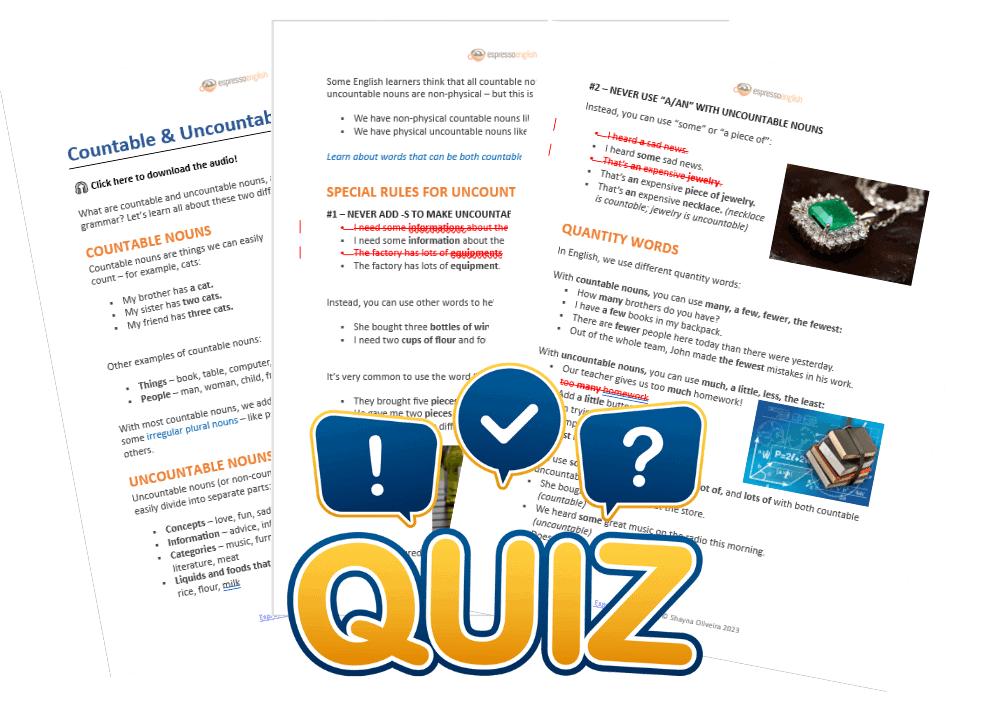What are countable and uncountable nouns, and how do we use them in English grammar? Let’s learn all about these two different types of nouns today! There are some details you need to know in order to make sure your sentences with uncountable nouns are grammatically correct.

Countable Nouns
Countable nouns are things we can easily count – for example, cats:
- My brother has a cat.
- My sister has two cats.
- My friend has three cats.
Other examples of countable nouns:
- Things – book, table, computer, banana, shirt, television, pen, house
- People – man, woman, child, friend, brother, sister, uncle, teacher, boss
With most countable nouns, we add -s to make them plural. But there are some irregular plural nouns – like person/people, man/men, child/children, and others.
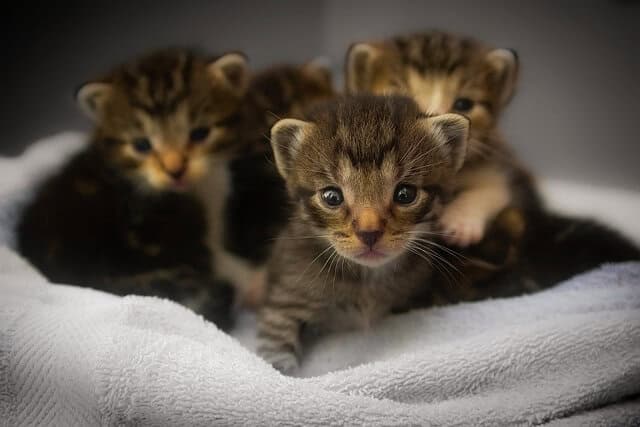
Uncountable Nouns
Uncountable nouns (or non-count nouns) are words that we can’t count, or can’t easily divide into separate parts:
- Concepts – love, fun, sadness, work, money, peace, safety
- Information – advice, information, news, knowledge
- Categories – music, furniture, equipment, jewelry, literature, meat
- Liquids and foods that can’t be counted – water, butter, rice, flour, milk
Some English learners think that all countable nouns are concrete nouns (physical things), and all uncountable nouns are abstract nouns (non-physical things) – but this is not true!
- We have abstract nouns that are countable, like ideas, beliefs, hopes, dreams.
- We have concrete nouns that are uncountable, like furniture, luggage, butter, and milk.
Learn more in this lesson on 10 types of nouns.
Learn about words that can be both countable and uncountable!
Special rules for uncountable nouns
#1 – Never add -s to make uncountable nouns plural:
I need some informations about the course.- I need some information about the course.
The factory has lots of equipments.- The factory has lots of equipment.
In some other languages, “information” can be made plural – but it’s incorrect in English, because it’s an uncountable noun!
Instead, you can use other words to help create a plural form:
- She bought three bottles of wine and five boxes of rice.
- I need two cups of flour and four tablespoons of butter for this recipe.
It’s very common to use the word “piece”:
- They brought five pieces of luggage on their vacation.
- He gave me two pieces of advice: eat less and exercise more.
- I’m practicing three difficult pieces of piano music.

Uncountable nouns by themselves take singular verbs, since they are grammatically singular nouns:
- The furniture is old. (not “are old”)
- His advice was good. (not “were good”)
However, if we add one of those “helping words” to create a plural form, then we use plural verbs:
- Those three crates of furniture are heavy. (crates –> are)
- His two pieces of advice were good. (pieces –> were)
#2 – Never use the indefinite article “a/an” with uncountable nouns
Instead, you can use “some” or “a piece of”:
I heard a sad news.- I heard some sad news.
That’s an expensive jewelry.- That’s an expensive piece of jewelry.
- That’s an expensive necklace. (necklace is countable; jewelry is uncountable)
However, the definite article (“the”) can be used with both countable nouns and uncountable nouns:
- The facts are accurate. (countable)
- The information is accurate. (uncountable)
- The necklace is expensive. (countable)
- The jewelry is expensive. (uncountable)
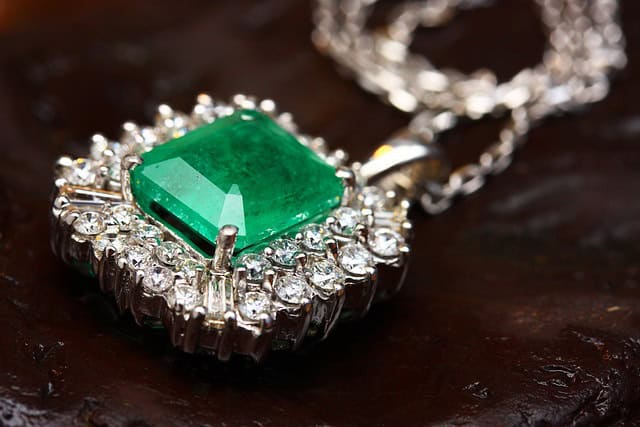
Expressing quantities of countable and uncountable nouns
In English, we use different quantity words:
With countable nouns, you can use many, a few, fewer, the fewest:
- How many brothers do you have?
- I have a few books in my backpack.
- There are fewer people here today than there were yesterday.
- Out of the whole team, John made the fewest mistakes in his work.
With uncountable nouns, you can use much, a little, less, the least:
- Our teacher gives us too much homework!
- Add a little butter to the recipe.
- I’m trying to eat less red meat.
- Compared to my friends, I make the least money.

We can use some, any, more, the most, a lot of, and lots of with both countable and uncountable nouns:
- She bought some bananas at the store.
(countable) - We heard some great music on the radio this morning.
(uncountable) - Does he have any children?
(countable) - He doesn’t have any furniture in his new house.
(uncountable) - We need to buy more bananas.
(countable) - We need to buy more equipment.
(uncountable) - I’ve read the most books in my class.
(countable) - The boss gave me the most work.
(uncountable) - She has a lot of / lots of friends.
(countable) - We’re having a lot of / lots of fun.
(uncountable)

Countable and Uncountable Nouns QUIZ!
Question 1 |
A | A lot of person |
B | Many people |
C | Much people |
Question 2 |
A | many tea |
B | much tea |
C | lots of tea |
Question 3 |
A | much problems |
B | a lot of problems |
C | many problem |
Question 4 |
A | a few violence |
B | many violences |
C | a lot of violence |
Question 5 |
A | four business trips |
B | much business trips |
C | four business travels |
Question 6 |
A | a little question. |
B | many question. |
C | a lot of questions. |
Question 7 |
A | so many chair |
B | twenty chairs |
C | much chairs |
Question 8 |
A | A few boxes |
B | Some box |
C | Any boxes |
Question 9 |
A | a lot of works |
B | some work |
C | many work |
Question 10 |
A | many music |
B | some musics |
C | a few songs |
Uncountable Noun List
Most nouns in English are countable – but here are some common uncountable nouns organized by category.
Liquids, grains, and semi-solids:
- Blood
- Cheese
- Dirt
- Flour
- Granola
- Honey
- Ice
- Juice
- Milk
- Oatmeal
- Rice
- Salt
- Sand
- Soap
- Sugar
- Water
- Yogurt
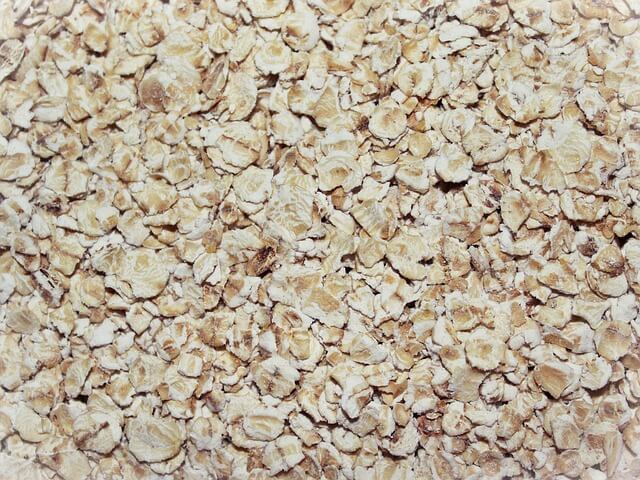
Categories or Mass Nouns:
- Agriculture
- Clothing
- Commerce
- Education
- Entertainment
- Equipment
- Furniture
- Garbage
- Infrastructure
- Knowledge
- Luggage
- Music
- Research
- Scenery
- Seafood
- Traffic
- Transportation
- Wildlife
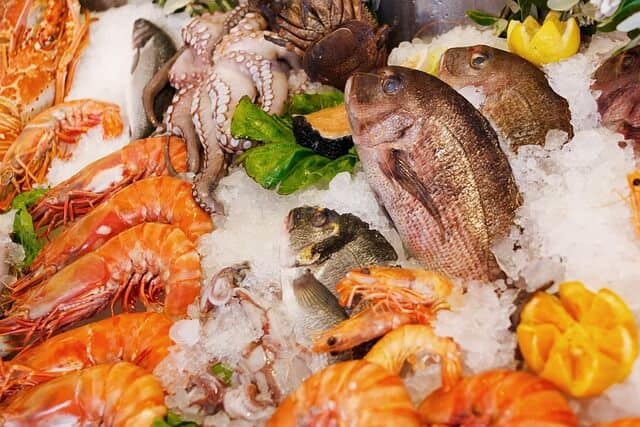
Abstract ideas or qualities:
- Access
- Attention
- Chaos
- Courage
- Creativity
- Damage
- Evidence
- Expertise
- Harm
- Honesty
- Intelligence
- Justice
- Leisure
- Magic
- Money
- Motivation
- Nature
- Nonsense
- Peace
- Silence
- Tolerance
- Violence
- Wealth
- Wisdom

Feelings:
- Anger
- Compassion
- Confusion
- Gratitude
- Guilt
- Happiness
- Jealousy
- Laughter
- Pride
- Sadness



